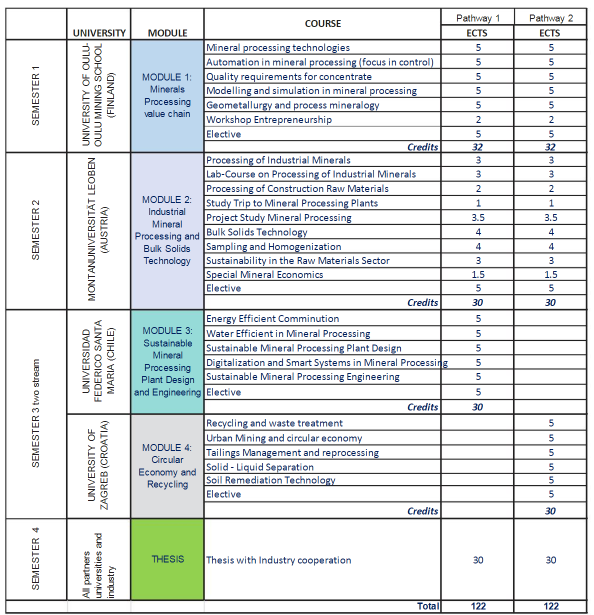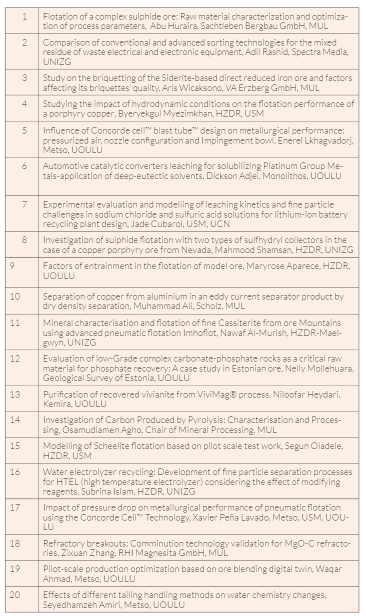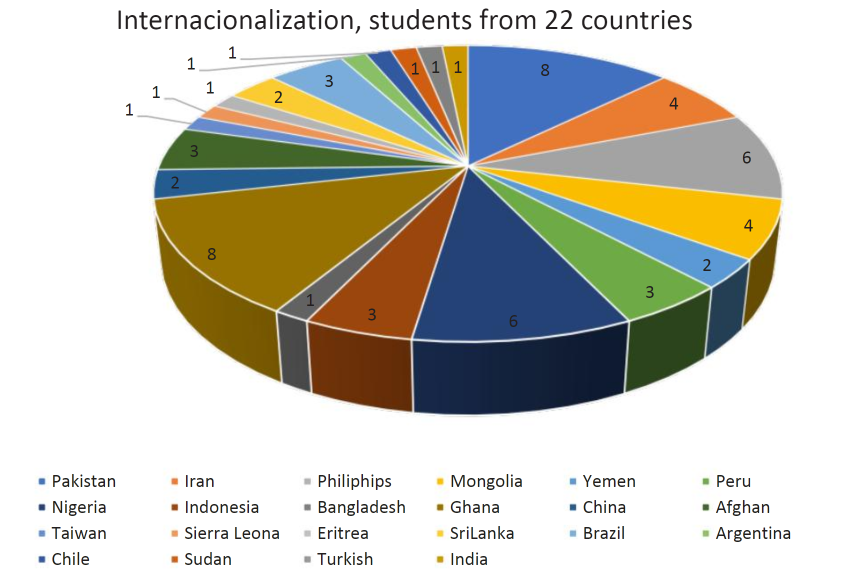
13 minute read
Maria Sinche Gonzalez: Importance for the industry and the internationalization of education in the mining field in Finland
from Materia 4/2024
Erasmus Joint Master in Sustainable Mineral and Metal Processing Engineering (EMJM-PROMISE) at the University of Oulu
In 2021 the Erasmus Joint Master in Sustainable Mineral and Metal Processing Engineering (EMJM-PROMISE) was selected to receive Erasmus+ funding. This is the first Erasmus Master coordinated by the University of Oulu, the only university in Finland selected as a coordinator between 2020-2022. It is one of the seven EMJM programs coordinated in Finland (EC et al., 2021). In 2024, with the occasion of the 20 years of Erasmus Mundus, EMJM-PROMISE was selected for showcasing in the publication of the European Education and Culture Executive Agency (EACEA) as an example of fostering curriculum design based on intended learning outcomes (EU & EACEA, 2024).
The EMJM-PROMISE is established due to the awareness of increasing demands in the quantity and quality of minerals and metals. The PROMISE consortium (Figure 1) involves the cooperation of four partners: the University of Oulu (UOulu) with the Oulu Mining School as main coordinator (Finland), the Montanuniversität Leoben-MUL (Austria), the University of Zagreb-UNIZG (Croatia) and the Universidad Tecnica Federico Santa Maria-USM (Chile). These partners complement and strengthen each other by involving top-level mineral processing laboratories, pilot plants, analytical equipment and recognized scholars and experts. In addition, the consortium has strong ties with the mineral processing industry. The cluster of 42 mining companies, research centres, suppliers and universities demonstrate their endorsement of this program (as associate partners).

1. Introduction
Mineral processing represents one of the most interesting subject areas, combining engineering, chemistry and mathematics. This is a discipline of liberation and concentration (Drinkwater, 2017) requiring common knowledge and skills in modelling and optimization, process design and synthesis, process control, reaction mechanisms (Hayes, 2018) and in geology, mineralogy, breakage, material characterization and handling, kinetics, innovative thinking, analytical skills, management practices and all capabilities for taking good metallurgical decisions.
Graduated mineral processors will use their specialized knowledge of the chemical and physical properties of metals and minerals to extract them from their natural ores and anthropogenic sources (by-products, wastes, low grade materials) and to maximize production whilst minimizing the overall environmental impact through sustainable practices. Great savings of resources (water and energy) and time can be achieved if skilled mineral processing professionals apply their mathematical modelling and simulation knowledge in plant design and optimization of unit operations (comminution, mineralogy, flotation, solid-liquid separation, circular use of process water). In the meeting organized by EIT Raw Materials in 2019 on the education in mining the risk of contracting a non-mineral processing engineer was pointed out (Heiskanen, 2019).
Low-grade and complex ores require new and innovative mineral processing practices, and Best Available Technologies (BAT) are required with greater respect for the environment and for society itself (future mining). In modern societies, besides the natural deposits, the relevance of anthropogenic material stocks increases. Some of the stock is still in use, but for others, there is a need for the development of new extraction methods or improvement of the existing ones. Landfill mining and processing of secondary raw materials becomes an important part of the circular economy that must be included in modern engineering curricula.
In the past decades, the competitiveness of professionals in areas of mining and mineral processing engineering in Europe has been decreasing. Key contributing factors to this are the small number of education programs that teach in this field and the generalised low number of applicants to engineering fields. In Finland, the University of Oulu, through the Oulu Mining School, is the only university that gives the degree in Mining Engineering and Mineral Processing Engineering.
It is also difficult to attract youngsters for a future in the mineral processing field, particularly in developed countries. Students are not aware of their excellent career opportunities in this field and of the importance of mining in modern society and the world economy. Moreover, stakeholders have different priorities, values and expectations. There has been a misunderstanding of mining by society due to the unawareness of the true value of the mining industry. It tends still to persist, as evidenced by the opposition to new mining projects (Eerola, 2024).
There are an insufficient number of mineral processing professionals for today’s increasing demand of minerals and metals, but universities cannot do everything alone. The participation of industry is required for the transfer of skills and knowledge. This has to be done by participating in their practical formation and by recruiting new graduates with coherent skills necessary for a sustainable minerals industry.
The consortium universities of PROMISE, as a part of the Erasmus Mundus program, recruit excellence. They do even more to recruit school leavers and graduates into this program to promote the mineral processing field. If we want a sustainable minerals industry, we need suitably qualified people. We will get these only by being proactive in our approach to recruitment and latter in work placement by involving many industrial partners.
2. Need of mineral processing engineers in the context of the Critical Raw Materials
(CRMs) (Figure 2) were listed by European Council for their importance to the economy and risk of supply. From the 34 CRMs identified, a specific list of 17 strategic raw materials has been created (in yellow) whose demand is expected to grow exponentially and whose extraction and production are complex and which are therefore at greater risk of supply.

There is a growing demand in quantity and diversity of minerals, metals and materials and it will accelerate as we move towards. a green economy and energy transition (renewable energies + rechargeable batteries, electromobility + use of electric vehicles, communication + IoT and other clean or carbon-neutral technologies).
The required number of mineral processing engineers for industrialized countries is around 500/year (UK Mining Education Forum, 2022). This need cannot be covered by regular education system, as there are now only a few programs in mineral processing.
3. Industry expectation of mineral processing engineers and the EMJM-PROMISE
Professional organizations have recognized the need of talented mineral processing professionals. For instance, the Society for Mining, Metallurgy & Exploration (SME) emphasized that the total resource recovery, recycling, by-product recovery and defensible measures of environmental impacts (particularly the ability to reconcile trade-offs between different social costs and benefits) must be reinforced by updated educational curriculums in the field.
The EMJM-PROMISE curriculum was built on the analysis of the needs of the stakeholders: 1) The result of an applied survey to twenty-three (23) companies shows the knowledge and skills expected from new graduates in mineral processing engineering and is summarized in Figure 3. 2). An analysis of current European and worldwide master programs and 3) a review of the latest publications about education in the mineral processing area were also carried out as preceding activities.

The clear target of the EU is to be less dependable of the CRMs and new projects and operations are starting in this field. They will potentially increase the competitiveness of mineral processing companies in the Nordics and other European countries.
A key prerequisite for such an increase in European competitiveness is to enhance the competences of the mining and processing experts. These professionals need to gain new knowledge and skills about mineralogy and processing of low-grade sources. Equally well they need to develop new abilities to collaborate, shape creative approaches for solving production problems, use digital tools such as modelling and simulation and take responsibility for the completeness of projects. These skills are required to continually design and redesign more complex mineral processing operations, and be more resource-efficient.
4. The EMJM-PROMISE programme structure of training courses
Students obtain broad competence with specialisation in the main areas of mineral beneficiation. This is emphasised in better mineral recovery from primary and secondary sources, metal recycling (urban mining) and by-product recovery.
The program was developed to meet the needs and expectations of industry (Figure 3). It includes a unique and integrated curriculum of 120 ECTS (Table 1) with theory supported by practice, internships, and six months of field work and thesis development. Optional courses (52 ECTS for the free selection) are also included.

Levels of exposure to innovative learning environments are addressed likewise as ”soft skills” development. Mainly this is realized through student-oriented open learning and interdisciplinary project work that are organized with workshops and summer schools including entrepreneurship, leadership, innovation, and languages (Finnish, German, Croatian, Spanish) coupled with the experience of cultural diversity.
5. Mobility, internationalization and transference of skills
The proposed EMJM-PROMISE program is highly relevant regarding the modernisation and internationalization in higher education. It has been designed to maximise the benefits for talented student mobility. Students move to at least three HEIs (Higher Education Institutes, Figure 4). The best education, top talent recruitment, smart partnership, research excellence, agile mobility, all contributing to global challenges are the common characteristics reflected in EMJM-PROMISE joint study program. It or PROMISE fulfills the Action Plan for Internationalization from 2020 onwards of the University of Oulu and the strategy of partners such as the Focus on Internationalization from MUL, Internationalization Strategy 2014-2025 from UNIZG and Internationalization Plan from USM.

The interaction of international and local students also means opportunities for internationalization at home for the students of the receiving institution. The interaction creates valuable internationalization opportunities also for those outside the EMJM program.
This project relies on a large network that reflects the international and multiscale cooperation of EU and non-EU partners. It undertakes challenges, such as the management of mineral resources, in general mineral and metal raw materials, with the responsibility to minimise the waste and environmental footprint, giving more opportunities to talented students achieving a conscious education.
5. Results
In 2024, twenty (20) new MSc professionals have graduated from the first cohort of students EMJM-PROMISE. They were hosted by a company or collaborated with one associate partner for the development of thesis. Upon completion, students are awarded multiple master’s degree diplomas and a diploma supplement (MSc diplomas from UOULU and MUL and from Chile if their mobility was there)
The research topics of the theses are relevant for the direct application in the processes, operation, design and optimization, such as those mentioned in Table 2.

The application interest and acceptation in the program increased from 199 applicants in 2021 to 384 in 2023 (Figure 5).

Students from twenty-two nationalities (Figure 6) are participating in the program and more students from Finland and the EU are invited to participate.

Seventy percent of the students were offered a job position before ending their studies. This shows high success in skills retention and employability.
6. Calling for the new application 2024 and looking for Finnish and EU students
The next application period is between October 1 and December 31, 2024. It is open to applicants worldwide.
EMJM PROMISE is particularly suited for graduates in mineral processing, metallurgical engineering, chemical engineering, materials and mineral resources engineering, earth resources engineering, raw materials and process engineering, mining and mineral engineering, mining engineering, geological engineering, related process engineering, raw materials engineers, materials and rock waste treatment engineering, or related engineering fields, with a minimum BSc degree. More information at www.master-promise.eu.
The scholarship includes € 1400/month for 24 months, waving fees and a comprehensive private insurance.
7. CONCLUSION
The EMJM-PROMISE promotes graduated students in mineral processing for the increased demand of critical raw materials.
The EMJM-PROMISE supports internationalization and promotes learners to gain new knowledge, skills and insights that will boost their careers and commitment to provide added value to the industry and society.
PROMISE provides graduates with the academic and practical skills required to meet the needs of a changing mineral processing engineering sector by emphasising student-centred learning approaches and academic-industry curriculum development.
The graduates with a Master´s degree in Sustainable Mineral and Metal Processing must be able to prioritise sustainable aspects of processing to provide accurate assessment and effective ongoing management for either ore variability (i.e., traditional mining extraction) or feed variability in general (e.g., urban mining). These represent a step-change innovation due to the combination of typical engineering approaches and sustainable criteria constraints.
The growing stress put upon natural resources and energy requirements indicates the necessity of educating professionals capable of dealing with technical and sustainable challenges, which will be an important contribution to society. Courses such as Recycling and Waste Treatment (UNIZG), Advanced Mineral Processing (MUL), Digitalization and Smart Systems in Mineral Processing (USM) and Innovative Extractive Technologies for Low-Grade and Complex Ores (UOULU) are examples of the innovative features covered by the EMJM-PROMISE program.
The EMJM-PROMISE includes the criteria of sustainability, circular economy and efficient and optimised raw material extraction

8. Acknowledgements
The financial support received from the European Union under the 101050446 grant Erasmus+ is gratefully acknowledged. Thanks also to Promise-partners and teachers of the program. ▲
MARIA SINCHE GONZALEZ
DOC., DR., SENIOR LECTURER MINERAL PROCESSING, MAIN COORDINATOR EMJM-PROMISE UNIVERSITY OF OULU
References
• Drinkwater, D. (2017). A roadmap for mineral processing education. Mineral Engineering Knowledge and Skills for Today’s Industry. IMPC Mineral Processing Commission.
• EC, EACEA, & Erasmus+ Programme. (2021). Statistical factsheets on the achievements of the Erasmus Mundus Joint Master Degrees (20142020), Publications Office of the European Union https://data.europa.eu/doi/10.2797/639462
• Eerola, T. (2024). The origin, evolution and impacts of the mining-sceptical movement in Finland. Extractive Industries and Society, 19. https:// doi.org/10.1016/j.exis.2024.101486
• EU, & EACEA. (2024). 20 years of Erasmus Mundus – Beyond borders and boundaries, European Commission, European Education and Culture Executive Agency, Ferencz, I., Kupriyanova, V. In EU; EACEA. https://doi. org/10.2797/7670
• European Council. (2024). An EU critical raw materials act for the future of EU supply chains https://www.consilium.europa.eu/en/infographics/critical-raw-materials/#0
• Hayes, P. C. (2018). The Changing World of Metallurgical Education. https://doi.org/10.1007/9783-319-95022-8_4
• Heiskanen, K. (2019). Mineral processing education from the industry perspective, EIT RawMaterials-Zagreb
UK Mining Education Forum. (2022). The Mining Sector’s Strategic Need for UK Mining Engineering and Mineral Processing Graduates










